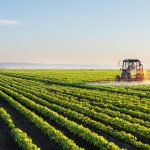We hear from CEO Today's top business leader of 2022 for Nigeria.
Can you tell us a little bit more about NIRSAL and what you do?
NIRSAL Plc, the Nigeria Incentive-Based Risk Sharing System for Agricultural Lending, is a USD $500 million Non-Bank Financial Institution and a wholly owned corporation of the Central Bank of Nigeria (CBN). It is designed to redefine, dimension, measure, re-price and share agribusiness-related credit risk.
The company was incorporated in 2013 to stimulate the flow of affordable finance and investment into the agricultural sector by de-risking the agriculture & agribusiness finance value chains, fixing agricultural value chains, building long-term capacity and institutionalising incentives for agricultural lending through its five strategic pillars: Risk Sharing, Insurance, Technical Assistance, Incentives and Rating.
NIRSAL Plc’s mission statement is to forge partnerships between agriculture and finance, maximising the potential of agriculture for food security, job creation and economic growth, while its vision is to transform the economy, deliver inclusive growth and impact lives.
NIRSAL Plc specialises in Agriculture & Agribusiness project development, finance facilitation and agricultural risk management. We optimise agriculture and agribusiness, integrate agricultural value chains, facilitate finance and investments and manage agricultural risks through innovative risk management models and original Tools, Techniques, Methodologies & Partnerships (TTM&Ps).
Some of NIRSAL Plc’s products and services include:
- NIRSAL Credit Risk Guarantee (CRG) to share credit-related losses with financiers
and investors with up to 75% principal and interest repayment.
- Interest Drawback Support to reward diligent borrower behaviour through discretionary
rebates of up to 40% of interest paid, thereby reducing the effective interest rate
for borrowers in good standing..
- Bespoke value chain-specific agribusiness modelling for primary production and
integrated projects.
- Financing frameworks developed for fertiliser, grains and mechanisation of
agriculture at scale, etc. to address working capital constraints associated with
specific segments of the agricultural value chain.
- Index-based insurance products to protect farmers’ revenues from losses due to pests,
diseases, adverse weather conditions and general drops in expected yields.
- Technical assistance support and capacity building for both agriculture and agriculture
finance actors.
- Comprehensive field monitoring comprising nationwide boots-on-ground Project Monitoring, Reporting and Remediation Officers, remote sensing using satellite based multispectral imaging and UAS-based monitoring.
- Farmer structuring through the NIRSAL Agro Geo-Cooperative® Farming Model.
Can you tell us about some of NIRSAL’s greatest achievements to date?
Since its creation to date, NIRSAL Plc has made considerable progress. As a result of rigorous prudence, NIRSAL has recorded less than 1% risk crystallisation or claims payout on its core transactions. The company has also paid out over $7 million in Interest Drawback in support of good borrower behaviour.
NIRSAL Plc has provided training and facilitated Agribusiness clinics for more than 700,000 farmers and over 4,200 Agric-desk officers of commercial banks across the country to build capacity and enhance productivity and the flow of finance and investments to the sector.
NIRSAL Plc has provided training and facilitated Agribusiness clinics for more than 700,000 farmers
In the area of Insurance, over 1.9 million farmers have so far subscribed to NIRSAL-facilitated index-based agricultural insurance products. Additionally, nine insurance companies have secured approvals from the National Insurance Commission (NAICOM) for the deployment of agricultural Insurance products as a result of NIRSAL Plc’s support.
In 2021, NIRSAL Plc also completed the development of Climate Risk Profiles (CRPs) for an initial six of 15+ agricultural commodities. CPRs are comprehensive guides to investing in the production of some select Industrial, Consumer and Export commodities in climate-challenged environments. This is projected to be a useful guide to our farming stakeholders for the next 40 years at a minimum.
The direct consequence of NIRSAL Plc’s aforementioned finance facilitation efforts is an estimated $2.5 billion worth of economic activity through agricultural products/outputs by the company’s interventions across agricultural value chains.
How is NIRSAL contributing towards the attainment of Nigeria’s food security goals?
The unstructured nature of primary production (farming) activities in Nigeria has historically deprived the country of the benefits that lie in economies of scale, mechanization and commercialisation of agricultural production for optimum yields and financial returns. From this viewpoint, NIRSAL has introduced several innovations to address the current suboptimal agricultural production system, which is a major threat to food security in the country. Some of these innovations include:
1) NIRSAL’s Agro Geo-Cooperative® (AGC) farming model. This is a structured approach to addressing the inefficiencies associated with prevalent smallholder farming on disaggregated plots of land measuring 0.5 to 1.5 hectares on average, based on convenience or cultural preferences.
Through the Agro Geo-Cooperative® farming model, NIRSAL aggregates parcels of contiguous farmlands of up to 250-hectare sizes within mapped Agricultural Commodity Ecological Areas (ACEA) then subsequently facilitates the flow of finance and investments to them whilst linking them to the Agricultural Input and Output markets.
The unstructured nature of primary production (farming) activities in Nigeria has historically deprived the country of the benefits that lie in economies of scale, mechanization and commercialisation of agricultural production for optimum yields and financial returns.
So far, up to 4,300 of these Agro Geo-Cooperatives® have been formed, covering over 943,297 hectares and 679,587 farmers. We have also formed 233 virtual Agro Geo-Cooperatives® (for non-crops) covering 7.5million production units of aquaculture and poultry and over 9,000 farmers. This means that, instead of going through the drudgery of financing millions of disaggregated entities to produce less output, financing would now be sought for only 4,300 entities cultivating about a million hectares of land, and 233 aquaculture and poultry entities. The numbers are still rising as our field systems are at work every day, collaborating with institutions and communities to achieve our goal of forming 16,000 Agro Geo-Cooperatives® in the near future.
In addition to the creation of Agro Geo-Cooperatives® to make primary production more efficient, NIRSAL is currently forming Input, Trading and Marketing Geo-Cooperatives® which entail the aggregation and GIS mapping of actors (Agro input suppliers, traders, and marketers respectively) within specified production areas into groups to service their respective linked markets. From this closely-knit arrangement, farmers are thus linked to nearby input suppliers and nearby processors, traders and marketers. This would make Nigeria’s agriculture sector a looped conveyor belt of value, with a strong case for commercial financing.
2) Agricultural Integrated Logistics Services. NIRSAL is currently collaborating with the Federal Ministry of Industry, Trade and Investment (FMITI), security agencies and relevant Ministries, Departments and Agencies of Government to draw up a policy on a Secured Agricultural Commodity Transport & Storage Corridor (SATS-C). This innovation is designed to address the challenges and bottlenecks experienced in the aggregation and haulage of food produce from the farm gate to markets across the country. It proposes a faster, secure, monitored and controlled approach to moving produce, rid of cases of multiple taxation and stoppages. SATS-C supports the free and timely movement of agricultural products irrespective of circumstances and would minimise wastage and post-harvest loss.
NIRSAL is also implementing the NIRSAL Climate-Smart Irrigation System for Smallholder Primary Production as a scalable solar energy and gas-powered irrigation technology supportive of sustainable, year-round smallholder primary production.
In what ways has your work developed since NIRSAL’s founding?
All of NIRSAL’s efforts in fixing broken agricultural value chains, increasing optimisation and providing adequate risk management help to increase the confidence of lenders and investors in financing agriculture and agribusiness in Nigeria.
To date, NIRSAL has facilitated over $716 million to various segments of the agricultural value chain from various sources, including deposit money banks, development financiers, private equity investment firms and other financial institutions. NIRSAL has trained over 4,200 staff of financial institutions to increase their understanding of the agriculture sector and its inherent potentials and orientate them on how to access available risk sharing and risk management instruments at NIRSAL.
To date, NIRSAL has facilitated over $716 million to various segments of the agricultural value chain from various sources
In 2021, NIRSAL developed several agribusiness models and collaborated with banks and financial institutions for the development of financing frameworks and financing product papers for the de-risked financing of Agro Geo-Cooperatives®, Trader Geo-Cooperatives and Marketing Geo-Cooperatives, with other products still in the works. Additionally, NIRSAL has developed five innovative index-based agricultural insurance products to deliver real value to agricultural value chain actors, and manage credit risks for lenders and investors as against the previous mono indemnity-based product that was available in the country before NIRSAL.
As a result of NIRSAL’s intervention, nine (9) private insurance companies now have the approval of the National Insurance Commission (NAICOM) to sell the NIRSAL-facilitated index-based agricultural insurance products. Over 1.9 million farmer subscriptions have been recorded for the products since 2018. NIRSAL is still developing more products for more effective field risk management in agriculture.
NIRSAL has contributed significantly to the increase in bank lending to agriculture from 1.4% to 5.2% as of Q4 2020, and has completed the development of Climate Risk Profiles (CRPs) for an initial 6 of 15+ specified, market-based agricultural commodities. These are comprehensive guides to investing in the production of some select Industrial, Consumer and Export commodities in climate-challenged environments. This is projected to be a useful guide to our agricultural stakeholders for the next 40 years at a minimum. We estimate that NIRSAL’s finance facilitation efforts have generated an additional $2.5 billion worth of economic activity through agricultural products/outputs and other value chain economic activities.
NIRSAL’s Credit Risk Guarantee beneficiaries attest to 20-60% increase in capacity utilization, productivity, number of markets served and sales value, and NIRSAL has been receiving overtures from other African countries to provide consulting support for the establishment and implementation of Risk Sharing facility models in their respective jurisdictions.
[ymal]
What challenges have you faced as head of NIRSAL during these endeavours?
Some of the challenges faced in the execution of NIRSAL’s innovative solutions include:
- Limitation of NIRSAL’s Risk Sharing Fund;
- Difficulty in securing large expanses of unencumbered agricultural land;
- Inadequate investments in land development and parcellation;
- Land access and title issues;
- Failure to revive idle/dead agricultural assets (plantations and infrastructure) across LGA, state and federal levels;
- Unavailability of patient capital for large scale agricultural investments;
- Non-harmonised agro-logistics system;
- Inadequacy of equipment, technological and intellectual capitals for agriculture.
NIRSAL continues to recreate and improve its solutions through the adoption of Science, Technology and Innovation (STI), to build the agility and capacity required for success in the volatile, uncertain and complex agricultural production environment typical of emerging agricultural economies of the world.
Can you share anything about your plans for 2022 and beyond?
NIRSAL will continue to pursue its target to aggregate, structure, optimise and facilitate finance and markets for 16,000 Agro Geo-Cooperatives® covering 4 million hectares of farmland and 8 million smallholder farmers over the medium term. We will also strengthen and expand efforts which commenced in 2021 in creating Processing, Trading and Marketing geo-cooperatives that will be mapped to production within Agro Geo-Cooperatives.
In addition, we will strengthen partnerships with financial institutions in finalizing and launching financing frameworks and product papers for increased flow of finance to various commodities and segments of agricultural value chains under risk-controlled arrangements. We will partner with relevant stakeholders to take our models to scale for a wider positive impact on economic growth, employment creation and livelihoods improvement.
About Aliyu Abdulhameed
Aliyu Abdulhameed, the pioneer Managing Director and Chief Executive Officer of the Nigeria Incentive-Based Risk Sharing System for Agricultural Lending (NIRSAL Plc), is an adept Agricultural Economist, corporate development expert and programme management specialist with varied experience in institution building, process development and operational improvement.
Under his leadership, NIRSAL has grown into a vibrant, high-performing institution that has notched impressive accomplishments and gained the respect and goodwill of beneficiaries, stakeholders and partners within and outside the country. It has facilitated over $716 million into the Nigerian agricultural and agribusiness sector through its credit risk guarantees; introduced innovative index-based insurance products to improve the income of farmers and reduce credit risk and created millions of direct and indirect jobs, that are positively impacting farmers’ livelihoods and communities across Nigeria.
In NIRSAL, Abdulhameed is building an avant-garde institution that is playing a key role in Nigeria’s fight against poverty and unemployment through the conceptualisation and deployment of agricultural programmes designed to engage and enrich millions of smallholder farmers and other value chain actors through the participation of commercial financiers. Inspired by NIRSAL’s track record of rigour and impact, governments across Africa are giving serious consideration to the NIRSAL model. Some have initiated contact with NIRSAL and are at various levels of discussion with the Abdulhameed-led management on the possible replication of the NIRSAL model in their respective jurisdictions.
Having brought a wealth of experience to NIRSAL, Abdulhameed continues to build a commanding resume for even bigger national and transnational corporate stewardship. His agricultural finance and risk management experience has been honed during these years at NIRSAL, making him a dexterous manager of investments and risk leveraging technology. As a result, the responsiveness of commercial banks to investing in the agriculture sector is growing remarkably from a bitter past of unmitigated losses.
In a development that highlights Abdulhameed’s growing regional influence, he was conferred with the Grande Chancellerie De L’Ordre Du Muno Award in June 2018 by Mr. Faure Essozimna Gnassingbé, President of the Republic of Togo. The award came after Abdulhameed successfully led the team that established the Togo Incentive-based Risk Sharing System for Agricultural Lending (TIRSAL/MIFA) – a replica institution of NIRSAL. This is with the support of the African Development Bank (AfDB).











